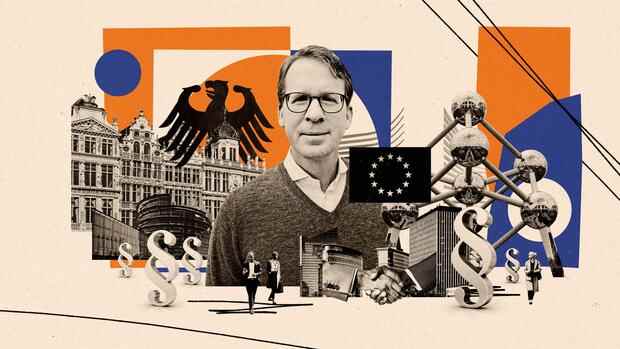Every week, Moritz Koch, head of the Handelsblatt office in Brussels, analyzes trends and conflicts, regulatory projects and strategic concepts from the inner workings of the EU. Because anyone interested in business needs to know what’s going on in Brussels. You can reach him at: [email protected]
Brussels The situation in Europe is precarious, and Brussels’ top officials are not afraid to say so. Josep Borrell, the EU’s chief diplomat, sees a “tsunami” rolling towards the state union, a “triple crisis” of expensive energy, rising food costs and unstable public finances. “If we don’t unite, we won’t survive,” he warns.
The dramatic rhetoric shows that the mood is changing in the economic war with Russia. Europeans’ confidence in their own strength is dwindling the closer winter approaches, the higher prices on the electricity exchanges jump and the more fears of a recession eat into the population’s consciousness.
While speculators are beginning to bet against the euro, the ruble has stabilized and the Russian central bank is cutting interest rates. Thanks to the high oil prices, Russia’s foreign exchange earnings are bubbling up, around a billion dollars a day. Kremlin chief Vladimir Putin can afford to cut gas supplies and deepen Europe’s energy crisis at will.
The EU, on the other hand, is busy tinkering with its sanctions regime, rushing from one emergency operation to the next. Now entry bans should turn the tide and finally bring the Russians to their senses. On Tuesday, the European foreign ministers want to discuss the proposal to make it more difficult for Russian citizens to enter the Schengen area.
Top jobs of the day
Find the best jobs now and
be notified by email.
As long as Ukrainians die defending themselves against Moscow’s invading army, Russians should no longer be able to enjoy the sweet life on the Mediterranean. At least that’s what the Finns, Balts and Poles are demanding. The federal government opposes it. As a compromise, it appears that the EU is terminating the simplified issuing of visas, which it agreed with Russia in 2007.
Sanctions are a war of attrition
However, this does not solve the actual problem, on the contrary, it continues: With constantly new sanctions debates, the EU is belittling itself – and Russia is belittling it. After all, hectic demands for improvements imply the failure of previous policies. But a failure can only be accounted for if the exaggerated expectations from the first weeks of the war are used as a yardstick.
The prospect of bringing Russia to its knees in an economic blitzkrieg was just as unrealistic as the Kremlin’s plan for regime change in Kyiv. The reality is a war of attrition – waged with heavy weapons in the Donbass and southern Ukraine, as well as sanctions and counter-sanctions on the raw materials and technology markets.
This requires perseverance, not alarmism. Europe’s sanctions are having an effect, at least those restricting technology transfer to Russia. Ironically, one indicator that is often used as evidence of the resilience of the Russian economy proves this: the Russian foreign trade surplus, i.e. the difference between income from exports and expenditure on imports.
Russia has little trouble finding buyers for its raw materials. India and China buy what the EU and the US scorn. The rebates that Moscow has to grant are offset by the rise in the price of oil. The raw material sanctions that have been the subject of heated debate in Germany have therefore achieved little.
But: The unexpected Russian foreign trade surplus, analysts expect at 250 billion dollars, more than twice as much as last year, is not an expression of economic strength. On the contrary, it proves that the Russian leadership has little opportunity to spend the money it has earned – although there is an urgent need to do so given the army’s high losses.
Western embargo means Russia cannot buy tech components. This prevents the war-torn armed forces from being retrofitted and the Kremlin’s war machine is permanently weakened. Europe is facing a difficult winter, Russia permanent infirmity.
More: Russia’s population is shrinking massively – the war is driving out highly qualified people in particular
